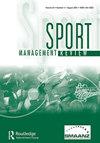扰乱生活的威胁对团队认同的影响
IF 3.8
1区 教育学
Q1 HOSPITALITY, LEISURE, SPORT & TOURISM
引用次数: 0
摘要
摘要团队身份会定期受到身份威胁的破坏,但很少有研究涉及破坏生命的威胁如何影响团队身份。在目前的研究中,作者采用了一种案例研究设计来研究生命威胁(即新冠肺炎大流行的开始)对团队认同的影响。作者利用采访和参与者日志,对认同至少一支运动队的个人进行了调查,发现随着这种扰乱生活的威胁的出现,团队认同大多是“不活跃的”。此外,尽管参与者认识到他们的粉丝群体在社交联系(即与其他粉丝的关系)和逃跑机会方面的重要性,他们强调,总的来说,在疫情爆发的最初几个月,成为球迷并不重要。总之,这些发现强调了从更“宏观”的角度研究团队身份(和身份威胁)的必要性,即将粉丝群体与粉丝生活中的其他显著因素结合起来考虑。亮点使用案例研究设计来了解生命威胁(即新冠肺炎大流行的开始)如何影响团队身份。在一段危及生命的时期,团队身份并不突出,成为一个不活跃的参照系。个人意识到,在这种扰乱生活的威胁中,他们的粉丝群体既重要又不重要。这项研究从宏观角度涉及团队身份,或者粉丝群体在多大程度上融入生活。本文章由计算机程序翻译,如有差异,请以英文原文为准。
The Impact of a Life-Disrupting Threat on Team Identity
ABSTRACT Team identity is periodically disrupted by identity threat, yet minimal research has addressed how life-disrupting threats impact team identity. In the current study, the authors employed a case study design to examine the effects of a life-disrupting threat (i.e., the start of the COVID-19 pandemic) on team identity. The authors, leveraging interviews and participant journaling, examined individuals who identify with at least one sport team, finding that team identity was mostly “inactive” as this life-disrupting threat set in. Further, although participants recognized the importance of their fandom in terms of social connectivity (i.e., relationships with fellow fans) and opportunity for escape, they emphasized that, overall, being a fan was unimportant during the early months of the pandemic. Collectively, these findings highlight the need to study team identity (and identity threat) from a more “macro” perspective – that is, considering fandom in conjunction with other salient factors in fans’ lives. HIGHLIGHTS A case study design was used to understand how a life-disrupting threat (i.e., the start of the COVID-19 pandemic) impacted team identity. During a period of life-disrupting threat, team identity was not salient, becoming an inactive frame of reference. Individuals recognized a simultaneous importance and unimportance of their fandom amid the life-disrupting threat. The research has implications concerning team identity from a macro perspective, or the extent to which fandom fits into the rest of life.
求助全文
通过发布文献求助,成功后即可免费获取论文全文。
去求助
来源期刊

Sport Management Review
Multiple-
CiteScore
9.00
自引率
7.30%
发文量
27
期刊介绍:
Sport Management Review is published as a service to sport industries worldwide. It is a multidisciplinary journal concerned with the management, marketing, and governance of sport at all levels and in all its manifestations -- whether as an entertainment, a recreation, or an occupation. The journal encourages collaboration between scholars and practitioners. It welcomes submissions reporting research, new applications, advances in theory, and case studies. The language of publication is English. Submissions are peer reviewed.
 求助内容:
求助内容: 应助结果提醒方式:
应助结果提醒方式:


